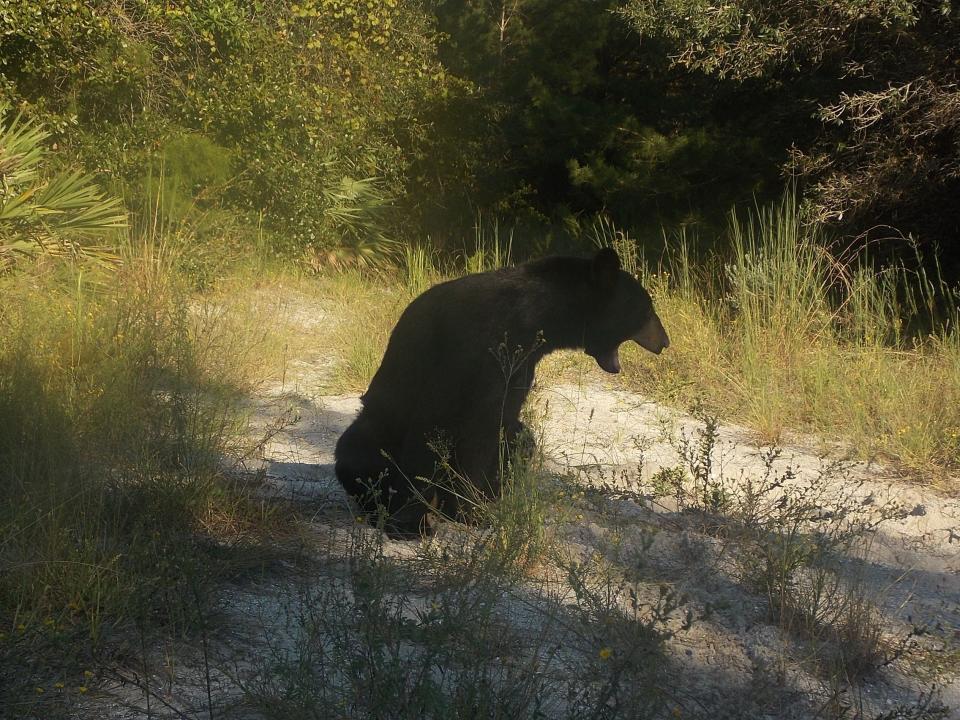500-pound black bear found shot, dead in Florida yard. What we know
The Florida Fish and Wildlife Commission is investigating the death of a nearly 500-pound black bear after it was found shot and killed in a Apopka neighborhood.
Close to Wekiwa Springs State Park, a resident said he spotted the dead bear when walking his dog and called law enforcement, prompting the FWC to come out and check out the scene. According to a Spectrum News report, the bear has an entry wound through its left torso and a bullet wound in a lung.
This recent incident has some thinking about a potential Florida bill that would allow people to shoot at a bear in an act of self defense. Could we be seeing more of these sudden black bear deaths pop up with the potential signing of the bill?
Here's what to know about the bear in Apopka and House Bill 87.
What happened to the Florida black bear in Apopka?
According to reports, homeowner Bill Lueckfeld was walking at night with his dog on June 6 when he found the bear lying in his front yard.
When the FWC arrived, they did an initial search for the bullet. As of now, it is unknown how far the bear traveled with the gunshot wound, or the circumstances of why it was shot.
"To me, it's very depressing, and it was heart-wrenching because to me that was a majestic animal. This is their territory. They lived here before we got here. Now we've moved in and we should be sharing it with them," Lueckfeld told FOX 35.
What is HB 87? Has DeSantis signed it?
HB 87 seeks to provide an exemption from penalties for killing bears without permits or authorization under certain circumstances. It passed 88-29 in the Florida House on Feb. 15 while the Senate's version SB 632 passed 24-12 in the Florida Senate days later.
Described as the “Self Defense Act,” the bill would exempt people from any administrative, civil or criminal penalties for killing a bear if:
The person is believed that it was necessary to avoid imminent death or serious bodily injury to their self, another person or a pet.
The person didn’t intentionally or recklessly put their self or pet in a situation where they would need to use lethal force.
Anyone who takes a bear must notify FWC within 24 hours, who will dispose of the body. No one may possess, sell or dispose of the bear or its parts.
As of June 18, DeSantis had not signed it. The most recent action was on June 7 where it was signed by officers and presented to the governor. If signed, the law would take effect on July 1 of this year.
Are Florida black bears rare? How many black bears are in Florida?
The Florida black bear, which is one of 16 subspecies of the American black bear, is listed as a "Recovered species."
A Tallahassee Democrat report shared biologists estimate there are a little over 4,000 bears in Florida. They are mostly shy and reclusive and live in hardwood forests. They usually weigh up to 350 pounds and eat mostly plants and insects.
The Florida Fish and Wildlife Conservation Commission (FWC) recently released a press statement to advise that juvenile Florida black bears might be seen in unexpected areas as they leave their mothers’ home ranges in search of new locations of their own to settle down.
Juvenile or yearling bears, between the ages of 1½ and 2½, start wandering on their own in spring and summer each year, according to FWC Bear Management Program Coordinator Mike Orlando.
Where are black bears found in Florida?

Florida black bears have been seen in nearly every part of Florida.
"While bears can be found almost anywhere in Florida, they prefer a mixture of flatwoods, swamps, scrub oak ridges, bayheads and hammock habitats. The area they roam in search of food, water, and adequate cover is called a home range," the FWC states.
Are Florida black bear attacks common?
According to data from the FWC, it’s rare for bears to injure people during an encounter. The organization shared its attack data with the Pensacola News Journal, highlighting 40 incidents of physical contact in Florida since 2006.
See data here: Florida black bear attacks are rare, but this new bill wants to loosen rules on killing them
What do you do if you see a Florida black bear? What should you not do?
The FWC says if you encounter a bear at close range, they suggest you "remain standing upright, back up slowly and speak to the bear in a calm, assertive voice."
"Never approach or surprise a bear. If you see a bear from a distance, enjoy the experience, but do not move toward the bear. If you are close, do not make any sudden or abrupt movements. Back way slowly and be sure the bear has an obvious escape route."
As for what not to do, the FWC advises you:
Do not make any sudden or abrupt movements
Do not run, this can trigger a chase instinct and bears can sprint up to 35 mph
Do not play dead, black bears eat dead things
Do not climb a tree, they can climb faster than you, too
Do not approach or surprise a bear, especially if one might be injured
The FWC says that you should aggressively fight back if a black bear attacks you. People have successfully fended off black bear attacks using simple tools like rocks and sticks or even their bare hands.
This article originally appeared on Fort Myers News-Press: Florida black bear found shot and killed in Apopka. What to know

